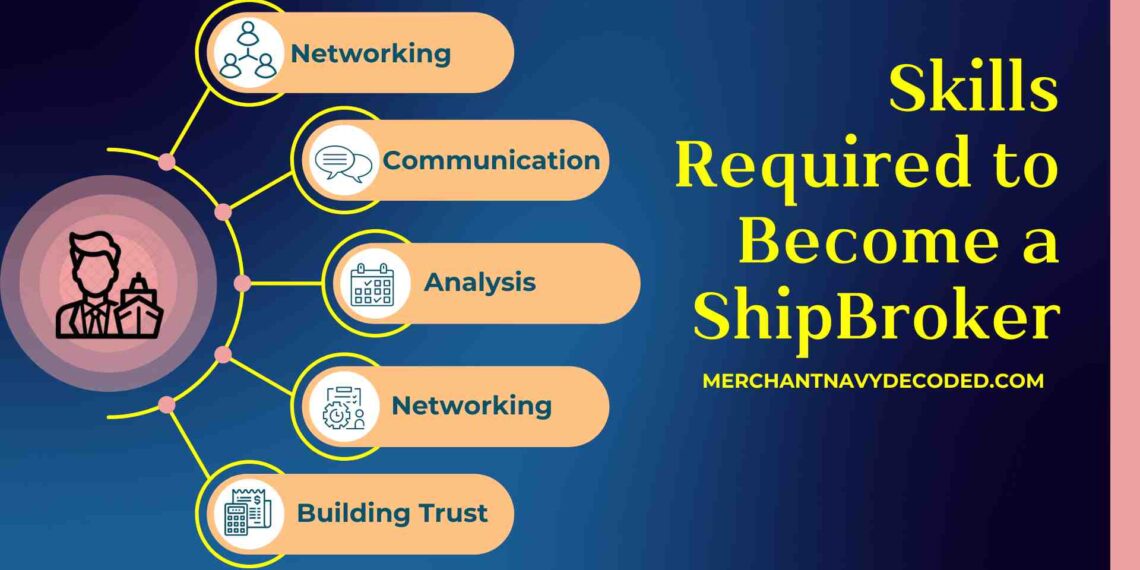Top 5 Qualities to Become a Ship Broker.
Ship Brokering Overview
A ship broker is a professional who facilitates the buying, and selling of the vessel. They work as an intermediary between ship brokers and ship owners. Ship brokers possess strong convincing and communication skills that will help them to negotiate or finalize the contracts. Building and maintaining strong relationships with clients, and the stakeholders in the shipping industry.
If you want to get complete information about Ship Brokering, you can check out our comprehensive blog about Ship Brokering that will you through the complete information regarding ship brokering.
1:- Qualities Required to Become a Shipbroker

A good shipbroker needs to possess some qualities that make them different from an average shipbroker. It requires a combination of specific qualities, skills, and characteristics that are essential for aspiring ship brokers.
2.1:- Skills Required to Become a Ship Broker
If you want to learn more about Ship Chartering and Ship Brokering, then you can check out our free course that delves completely into the opportunity these professions give seafarers who want to shift from ship to shore.
1) Communication Skills
Having good communication skills is very crucial to building connections with clients and conveying information effectively. The individual should possess the ability to talk vigilantly with their words, should know how to convince people, and have the skills to negotiate and get both parties on favorable terms. Effective communication skills enhance the brokers’ ability to convey information, resolve conflicts, negotiate between deals, and facilitate successful transactions.
2) Market Analysis
Market analysis plays a crucial role in ship brokering as it helps to understand the current dynamics of the industry. The analysis of the market is very essential to get information about the factors affecting it such as the trends or fluctuations, to provide the clients with the right information. Knowing the industry will help you assess the risks involved and solve the problems that arise in between.
3) Networking
Building connections and relationships in the industry with clients, ship owners, ship charters, and other ship brokers. Building a strong network of contacts provides brokers with access to valuable resources and information. By facilitating more deals the network is expanded. It allows shipbrokers to build trust and credibility within the industry. Actively engaging in networking, finalizing contracts, and making meaningful relationships within the maritime industry will contribute to their business growth.
4) Building Trust
To become a proficient shipbroker one needs to build connections and build trust within the industry by demonstrating professionalism, experience, and reliability. Establishing genuine connections with clients, ship owners, and charterers builds trust, encourages repeat of business, and recommendations, and opens doors for collaborations.
5) Ethical conduct
Ethical conduct in ship brokering builds trust, maintains integrity, and encourages long-term relationships within the shipping industry. Ethical conduct involves being honest and providing accurate and truthful information to the clients. Maintaining transparency throughout the contract. A ship broker should do the work with professionalism, and accountability and they should take responsibility for their actions. Conducting business ethically increases the ship broker’s reputation and also contributes to the sustainability of the maritime industry.
3:- Day in the life of a shipbroker

A day in the life of a shipbroker depends on his way of working but usually, the day of a shipbroker begins at 6-7 am.
- The first thing to do is to analyze and check the status of the market, its trends, and fluctuations.
- Going through the emails from the clients of the ship owners regarding their requirements.
- Then check the status of the cargo or ship handled by the broker.
- Getting to know the views of others on the market, and what the others are doing or what their perspective towards the market is.
- Analyzing the market and working on his report towards the market, this analysis helps them identify opportunities for their clients and also during decision making.
- Then the major part of the ship broker’s day is spent looking out for the business with their clients.
A day in the life of a shipbroker is fast-paced and depends on the market dynamics. It includes market analysis, client management, negotiation, communication with the clients, and facilitating more contracts. To effectively handle the technicalities of the shipping industry and offer value to their clients in a highly competitive environment, brokers need to be adaptable, proactive, and detail-oriented.
4:- Qualification required to become a shipbroker
To become a shipbroker the individual needs to have academic qualifications to join a college. Companies don’t want any specific education qualifications. However, different companies have different criteria and they vary from company to company.
4.1:- Academic qualification
- To join a college one needs to have some academic qualifications. You need to do programs for it.
- The individual can go for professional programs offered by the Institute of Chartered Shipbrokers (ICS).
- In India, colleges like Narottam Morarjee Institute of Shipping(NMIS), Amity University, and International Maritime Business Academy(IMBA) offer professional programs and undergraduate courses such as BBA in logistics, BBA in supply chain, BBA in Maritime Business Management.
- While selecting the college you should make sure to check all the modules, faculty, and companies coming for placements, and check the course if it is relevant or not for the company.
- The modules should consist of topics such as negotiation, voyage estimation, laytime calculation, and charterer parties.
- They also offer post-graduation courses in Maritime Supply Chain Logistics, Dry Shipping Maritime Law, or MBA in Maritime Sector.
- The individual can also do a PhD for further education.
- Mariners can pursue programs such as the Executive Maritime Management Program. These programs are for learning the basics and to get a degree.
- Having a certificate of competency(CoC) will make the candidate more valuable to the company because of the technical knowledge.
5:- Conclusion
In conclusion, an effective shipbroker has a set of essential qualities for success in the commercial sector of the maritime industry. Knowing well about the maritime industry, effectively negotiating abilities according to the requirements to finalize the contracts, communicating while being transparent, and being vigilant with your words will keep you ahead from everyone else.
Disclaimer :- The opinions expressed in this article belong solely to the author and may not necessarily reflect those of Merchant Navy Decoded. We cannot guarantee the accuracy of the information provided and disclaim any responsibility for it. Data and visuals used are sourced from publicly available information and may not be authenticated by any regulatory body. Reviews and comments appearing on our blogs represent the opinions of individuals and do not necessarily reflect the views of Merchant Navy Decoded. We are not responsible for any loss or damage resulting from reliance on these reviews or comments.
Reproduction, copying, sharing, or use of the article or images in any form is strictly prohibited without prior permission from both the author and Merchant Navy Decoded.



